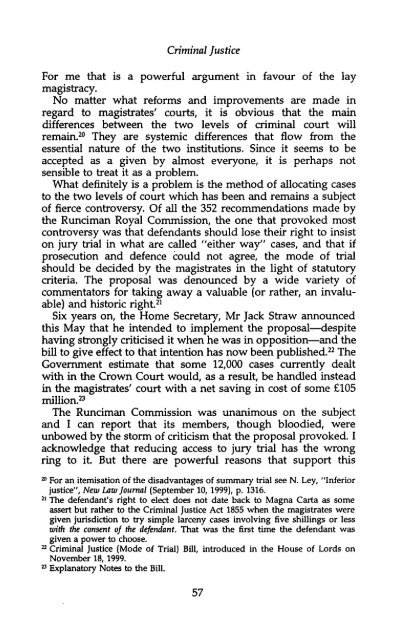HAMLYN - College of Social Sciences and International Studies ...
HAMLYN - College of Social Sciences and International Studies ...
HAMLYN - College of Social Sciences and International Studies ...
You also want an ePaper? Increase the reach of your titles
YUMPU automatically turns print PDFs into web optimized ePapers that Google loves.
Criminal Justice<br />
For me that is a powerful argument in favour <strong>of</strong> the lay<br />
magistracy.<br />
No matter what reforms <strong>and</strong> improvements are made in<br />
regard to magistrates' courts, it is obvious that the main<br />
differences between the two levels <strong>of</strong> criminal court will<br />
remain. 20 They are systemic differences that flow from the<br />
essential nature <strong>of</strong> the two institutions. Since it seems to be<br />
accepted as a given by almost everyone, it is perhaps not<br />
sensible to treat it as a problem.<br />
What definitely is a problem is the method <strong>of</strong> allocating cases<br />
to the two levels <strong>of</strong> court which has been <strong>and</strong> remains a subject<br />
<strong>of</strong> fierce controversy. Of all the 352 recommendations made by<br />
the Runciman Royal Commission, the one that provoked most<br />
controversy was that defendants should lose their right to insist<br />
on jury trial in what are called "either way" cases, <strong>and</strong> that if<br />
prosecution <strong>and</strong> defence could not agree, the mode <strong>of</strong> trial<br />
should be decided by the magistrates in the light <strong>of</strong> statutory<br />
criteria. The proposal was denounced by a wide variety <strong>of</strong><br />
commentators for taking away a valuable (or rather, an invaluable)<br />
<strong>and</strong> historic right. 21<br />
Six years on, the Home Secretary, Mr Jack Straw announced<br />
this May that he intended to implement the proposal—despite<br />
having strongly criticised it when he was in opposition—<strong>and</strong> the<br />
bill to give effect to that intention has now been published. 22 The<br />
Government estimate that some 12,000 cases currently dealt<br />
with in the Crown Court would, as a result, be h<strong>and</strong>led instead<br />
in the magistrates' court with a net saving in cost <strong>of</strong> some £105<br />
million. 23<br />
The Runciman Commission was unanimous on the subject<br />
<strong>and</strong> I can report that its members, though bloodied, were<br />
unbowed by the storm <strong>of</strong> criticism that the proposal provoked. I<br />
acknowledge that reducing access to jury trial has the wrong<br />
ring to it. But there are powerful reasons that support this<br />
20 For an itemisation <strong>of</strong> the disadvantages <strong>of</strong> summary trial see N. Ley, "Inferior<br />
justice", New Law Journal (September 10, 1999), p. 1316.<br />
21 The defendant's right to elect does not date back to Magna Carta as some<br />
assert but rather to the Criminal Justice Act 1855 when the magistrates were<br />
given jurisdiction to try simple larceny cases involving five shillings or less<br />
with the consent <strong>of</strong> the defendant. That was the first time the defendant was<br />
given a power to choose.<br />
22 Criminal Justice (Mode <strong>of</strong> Trial) Bill, introduced in the House <strong>of</strong> Lords on<br />
November 18, 1999.<br />
23 Explanatory Notes to the Bill.<br />
57

















